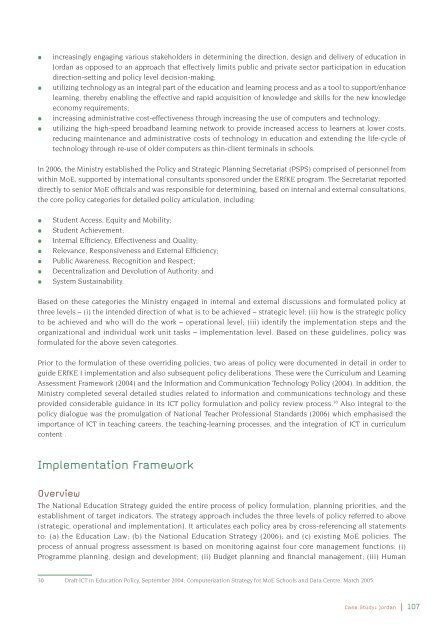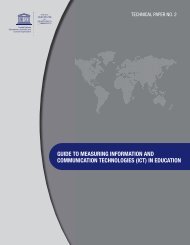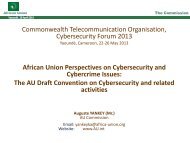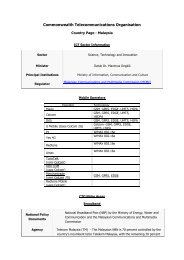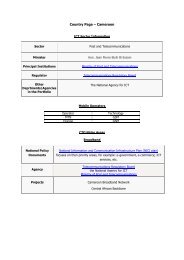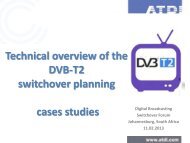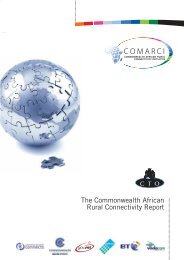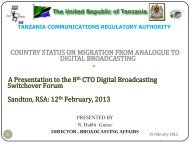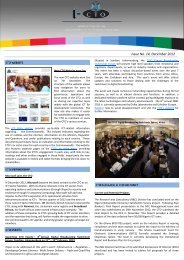Transforming education: the power of ICT policies - Commonwealth ...
Transforming education: the power of ICT policies - Commonwealth ...
Transforming education: the power of ICT policies - Commonwealth ...
You also want an ePaper? Increase the reach of your titles
YUMPU automatically turns print PDFs into web optimized ePapers that Google loves.
apple increasingly engaging various stakeholders in determining <strong>the</strong> direction, design and delivery <strong>of</strong> <strong>education</strong> in<br />
Jordan as opposed to an approach that effectively limits public and private sector participation in <strong>education</strong><br />
direction-setting and policy level decision-making;<br />
apple utilizing technology as an integral part <strong>of</strong> <strong>the</strong> <strong>education</strong> and learning process and as a tool to support/enhance<br />
learning, <strong>the</strong>reby enabling <strong>the</strong> effective and rapid acquisition <strong>of</strong> knowledge and skills for <strong>the</strong> new knowledge<br />
economy requirements;<br />
apple increasing administrative cost-effectiveness through increasing <strong>the</strong> use <strong>of</strong> computers and technology;<br />
apple utilizing <strong>the</strong> high-speed broadband learning network to provide increased access to learners at lower costs,<br />
reducing maintenance and administrative costs <strong>of</strong> technology in <strong>education</strong> and extending <strong>the</strong> life-cycle <strong>of</strong><br />
technology through re-use <strong>of</strong> older computers as thin-client terminals in schools.<br />
In 2006, <strong>the</strong> Ministry established <strong>the</strong> Policy and Strategic Planning Secretariat (PSPS) comprised <strong>of</strong> personnel from<br />
within MoE, supported by international consultants sponsored under <strong>the</strong> ERfKE program. The Secretariat reported<br />
directly to senior MoE <strong>of</strong>fi cials and was responsible for determining, based on internal and external consultations,<br />
<strong>the</strong> core policy categories for detailed policy articulation, including:<br />
apple Student Access, Equity and Mobility;<br />
apple Student Achievement;<br />
apple Internal Effi ciency, Effectiveness and Quality;<br />
apple Relevance, Responsiveness and External Effi ciency;<br />
apple Public Awareness, Recognition and Respect;<br />
apple Decentralization and Devolution <strong>of</strong> Authority; and<br />
apple System Sustainability.<br />
Based on <strong>the</strong>se categories <strong>the</strong> Ministry engaged in internal and external discussions and formulated policy at<br />
three levels – (i) <strong>the</strong> intended direction <strong>of</strong> what is to be achieved – strategic level; (ii) how is <strong>the</strong> strategic policy<br />
to be achieved and who will do <strong>the</strong> work – operational level; (iii) identify <strong>the</strong> implementation steps and <strong>the</strong><br />
organizational and individual work unit tasks – implementation level. Based on <strong>the</strong>se guidelines, policy was<br />
formulated for <strong>the</strong> above seven categories.<br />
Prior to <strong>the</strong> formulation <strong>of</strong> <strong>the</strong>se overriding <strong>policies</strong>, two areas <strong>of</strong> policy were documented in detail in order to<br />
guide ERfKE I implementation and also subsequent policy deliberations. These were <strong>the</strong> Curriculum and Learning<br />
Assessment Framework (2004) and <strong>the</strong> Information and Communication Technology Policy (2004). In addition, <strong>the</strong><br />
Ministry completed several detailed studies related to information and communications technology and <strong>the</strong>se<br />
provided considerable guidance in its <strong>ICT</strong> policy formulation and policy review process. 30 Also integral to <strong>the</strong><br />
policy dialogue was <strong>the</strong> promulgation <strong>of</strong> National Teacher Pr<strong>of</strong>essional Standards (2006) which emphasised <strong>the</strong><br />
importance <strong>of</strong> <strong>ICT</strong> in teaching careers, <strong>the</strong> teaching-learning processes, and <strong>the</strong> integration <strong>of</strong> <strong>ICT</strong> in curriculum<br />
content .<br />
Implementation Framework<br />
Overview<br />
The National Education Strategy guided <strong>the</strong> entire process <strong>of</strong> policy formulation, planning priorities, and <strong>the</strong><br />
establishment <strong>of</strong> target indicators. The strategy approach includes <strong>the</strong> three levels <strong>of</strong> policy referred to above<br />
(strategic, operational and implementation). It articulates each policy area by cross-referencing all statements<br />
to: (a) <strong>the</strong> Education Law; (b) <strong>the</strong> National Education Strategy (2006); and (c) existing MoE <strong>policies</strong>. The<br />
process <strong>of</strong> annual progress assessment is based on monitoring against four core management functions: (i)<br />
Programme planning, design and development; (ii) Budget planning and fi nancial management; (iii) Human<br />
30 Draft <strong>ICT</strong> in Education Policy, September 2004; Computerization Strategy for MoE Schools and Data Centre, March 2005.<br />
Case Study: Jordan | 107


